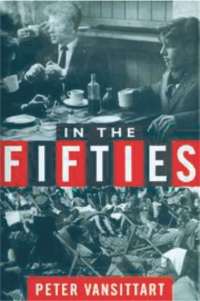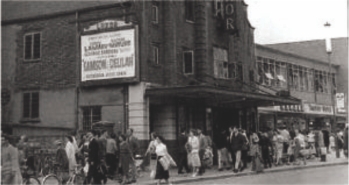| Home - Back Issues - The Team - Contact Us |
 |
| Volume 10 |Issue 30 | August 05, 2011 | |
|
|
Book Review A Pleasant Enough Decade Kaiser Haq
For a long time since the last fin-de-siècle we seemed able to take contemporary history only in decade-size bites, each with its distinctive literary-artistic and popular-cultural flavour: the aestheticist Naughty Nineties, the High Modernist Roaring Twenties, the Post-modern Swinging Sixties. The thirties might be dubbed radical, the Forties neo-Romantic, and the Fifties . . . we are coming to that. If from the Seventies we have stopped baking history in this decade-ent style it is because the dough has lost all consistency: the conjuncture of a dominant artistic trend with a peculiar life-style is missing; things are more mixed-up. But older decades remain amenable to fresh, even revisionary, treatment, as in this breezy memoir whose overall import is no less than a 'deconstruction' of the received view of the Fifties as strait-laced, miserable, unadventurous, a foil to the joyous, permissive, innovative Sixties. Peter Vansittart (1920-2008) was a prolific and highly regarded historical novelist and memoirist, who perfected an engaging if idiosyncratic style. In this book, first published in 1995 by John Murray, London, he is motivated as much by distaste for the Sixties – which 'recall for me little save huge coiffures' pretentious idleness, much noise, a drizzle of slogans, some curiously named Adult Cinema, gaily-tinted and over-priced clothes, skirts rising rapidly, prices rising more slowly' – as by love for the Fifties, which 'I enjoyed . . . often laughing immediately.' He wept too, at the death of Shaw, but whatever else suggests the elegiac is treated unlachrymosely. The decline of the dance band, music hall, tram, tuppeny tea, popular literary essay, is noted with unsentimental regret, and more generally, by parading an army of 'significant eccentrics' and many just plain barmy, who easily elicit a chuckle a page, the avowed aim of providing 'readable entertainment' is amply realised. Vansittart claims his mind is narrow and unanalytical. Narrow it is not and only a hidebound pedant would object to the unanalytical, impressionist picture of 'how life seemed to me in the Fifties, somewhat influenced by how it seems to me now,' with the salutary acknowledgement of the rise of feminism, heralded by Beauvoir's seminal, The Second Sex (1953), or of writers from the defunct Empire – R K Narayan, Mulk Raj Anand, Dom Moraes, Khushwant Singh, Naipaul, Walcott, George Lamming. Lest this smack of political correctness, there's the farcical counter-point of an ex-colonial 'admirer' promising to find time to read one of Vansittart's books if he will 'despatch me by return end in promptitude the works of Mr Miller, Mr Henry Miller, and any books, columns or essays about the Princess Margaret and her Groupy.' On another occasion in Hyde Park, an Indian plucks his sleeve to announce a plan 'to arrange a marriage between Princess Margaret and a rich Bengali, thus uniting commerce and breeding, promoting ethnic harmony and general goodwill.' Bengali myself, I can see the man's enduring wisdom: arranged matches with daughters of Maharajas may keep Britain's princes out of connubial crises and hence safeguard the Monarchy against scandalous collapse. It's worth noting at this point that amidst the earnest chatter about decolonisation, Vansittart observes that the Empire had, laudably, taught its victims irony.
Purporting to deal with various aspects of culture and society and political grotesquerie, the remaining baker's dozen chapters, happily, develop somewhat freewheelingly, certain themes recurring in a fugal manner. Some of the chapter headings seem interchangeable, and one 'Developments' – quite pointless. Rather than a tidy structure, Vansittart aims at 'style which, like love, can only be demonstrated.' Care for style explains his admiration for Karl Kraus, the Viennese satirist who inveighed against the prostitution of the word. Though quite different in temperament Vansittart shares with him a love of the sentence as a stylistic unit. Each is shaped for effect, at times epigrammatic: 'Power is always concerned with superstition, much of it being itself superstition.' Canetti, an admired presence in Fifties London cafés, has noted that to Kraus, under whose spell he had attained intellectual maturity, 'the sentence must be untouchable, no gap, no crack, no false comma. Sentence joins sentence, piece joins piece into a Great Wall of China.' Such is Vansittart's ideal too. Vansittart demonstrates that the seminal Fifties contained much of what the Sixties are known for, only in moderation. 'Teenagers' appeared and dubbed everyone else 'squares.' Dr Spock taught 'Problem Parents' (Vansittart's coinage) to be righteously proud of their spoilt brats. Rock-and-roll crazy Teddy Boys on motorbikes found a novelistic celebrant in Colin McInnes who, grey hair notwithstanding, claimed he was a teenager. Kinsey's study began to enliven sexual practices. Huxley set himself up as a drug guru. The first Comprehensive School opened. Vansittart, teaching at Burgess Hill, founded in the Thirties by Herbert Read on anarchist principles, had ample opportunity to relish the folly of unbridled libertarianism. The ICA (Institute of Contemporary Art) opened and became a stage for lively clashes. Important cult books of the Sixties came out: Burroughs' Junkie (1953) and The Naked Lunch (1959), Ginsberg's Howl (1956). Che Guevara posters made their appearance in 1959. Existentialism, through Sartre, Camus and the English populariser Colin Wilson, laid the foundation of the Do-your-own-thing philosophy of the Sixties. Wilson was also bracketed in the 'disparate group' dubbed 'Angry Young Men', alongside Kingsley Amis, Alan Sillitoe and John Osborne, whose play Look Back in Anger (1956) inspired the label in the first place. Beckett's Godot (1952) enigmatically pointed out the absurdity of it all. Sociology gained academic respectability, and produced catchy titles: The Lonely Crowd, The Organisation Man, The Hidden Persuaders. Vansittart's revamped Fifties is finally rather un-Fiftieslike. Having begun by recalling laughter he ends by remembering 'a pleasant enough decade, with the pitfalls and graces, atrocities and hopes inseparable from life in any period.' It is folly, as Buddhists might say, to cling to anything, even a beloved decade. But the lively telling of its tale, as here, can be memorable.
Copyright (R) thedailystar.net 2011 |

 With chronological aptness, Vansittart opens with three chapters on survivors from previous decades, colossi like Eliot, Churchill, Picasso, De Gaulle, Einstein, alongside lesser but no less interesting figures, perhaps the most memorable being Frederic Prokosch, American son of an Austrian linguist, who announced his imminent arrival in Thirties' England by sending nude photographs of himself to the Auden gang, became a colourful celebrity hunter, and out of travel literature concocted The Asiatics, still a good read.
With chronological aptness, Vansittart opens with three chapters on survivors from previous decades, colossi like Eliot, Churchill, Picasso, De Gaulle, Einstein, alongside lesser but no less interesting figures, perhaps the most memorable being Frederic Prokosch, American son of an Austrian linguist, who announced his imminent arrival in Thirties' England by sending nude photographs of himself to the Auden gang, became a colourful celebrity hunter, and out of travel literature concocted The Asiatics, still a good read.